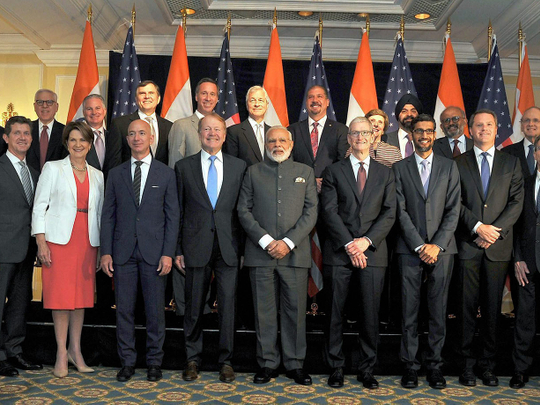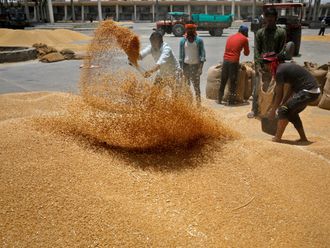
Washington: Prime Minister Narendra Modi on Sunday told top American executives that India is a business-friendly country of “minimum government,” as he prepared for a first meeting with President Donald Trump aimed at improving ties and moving past differences over climate change.
The meeting Sunday at a Washington hotel included the heads of some of the top US technology companies, including Google’s Sundar Pichai, Satya Nadella of Microsoft and Shantanu Narayen from Adobe Systems, all of whom are Indian American. Also present were Apple’s Tim Cook and Amazon’s Jeff Bezos.
Gopal Baglay, an External Affairs Ministry spokesman, sent a tweet from the meeting quoting Modi as saying that thousands of reforms had made India a place of “minimum government, maximum governance,” the Indian Express reported.
The “minimum government” part of the message was expected to resonate with Trump, who has proposed streamlining what he calls business-hampering US regulations and cutting the budgets of several US government agencies.
Some commentators have argued that Modi and Trump should have a natural affinity. Both are political outsiders, unafraid to shake up the status quo, who have risen to power in part by castigating the traditional ruling elite while offering a strongly nationalistic vision.
But while relations between the world’s two largest democracies had warmed under Trump’s predecessor Barack Obama, as India sought greater foreign investment and trade ties, it was not long after Trump’s election that obstacles emerged on issues such as trade and visas for Indians wanting to work in the United States.
Then Trump accused India of seeking to profit from the Paris climate accord as he announced the US withdrawal from the deal this month — drawing sharp denials from New Delhi.
Officials were eager to downplay expectations for Monday’s visit, describing it as “no frills” — in contrast to Modi’s first US visit in 2014, when he basked in a rock-star welcome at the Madison Square Garden arena in New York and addressed the United Nations.
“If there’s one thing we want (from the visit), it’s chemistry,” said one senior Indian official. “If the chemistry is good then frankly everything else gets sorted.”
Red carpet treatment
One US official said the two leaders had a lot in common and noted Modi would be the first foreign dignitary to have a working dinner at the White House under the new administration.
“We are really seeking to roll out the red carpet,” said the official, speaking on condition of anonymity.
Initial signs were positive, with the leaders exchanging warm words on Twitter.
“Important strategic issues to discuss with a true friend!” Trump wrote late Saturday.
“Thank you @POTUS for the warm personal welcome. Greatly look forward to my meeting and discussions with you @realDonaldTrump,” Modi tweeted in response.
‘Make in India’
Trump’s protectionist instincts, however, are at odds with India’s efforts to boost exports and encourage Western manufacturers to “Make In India” — a flagship Modi scheme.
The Indian premier castigated “rising parochial and protectionist attitudes” in a speech shortly after Trump took office that was widely interpreted as a dig at the president’s “America First” mantra.
A proposed overhaul of H-1B visas — used by thousands of Indian software engineers to work in the United States — has also caused concern in New Delhi.
Analysts said Monday’s meeting at the White House would give Modi the chance to size up a US leader whose focus has so far been on ties with India’s regional rival China.
“The meeting between the two leaders is very significant, obviously, because the new administration’s policies towards Asia and particularly India are not very clear,” said Sujit Datta, foreign policy specialist at New Delhi’s Jamia Millia Islamia University.
Regional security is expected to be high on the agenda for the talks as Washington considers deploying up to 5,000 extra troops in Afghanistan to help local forces fighting insurgent groups.
The new administration has also indicated it could take a tougher stance on Pakistan, which India has long accused of harboring militant groups.
Modi, a Hindu nationalist, was effectively barred from the United States for years after deadly communal riots in the western state of Gujarat while he was chief minister. Most of those killed were Muslims.
But after his landslide election victory, Modi built a strong rapport with Obama.
Political analyst Ashley Tellis said in an interview with Asian Age that the meeting with Trump would give Modi “an opportunity to take the measure of the man, articulate India’s interests, and describe the opportunities those interests provide for the US.”
“I don’t think PM Modi can change Trump’s worldview. But he can help Trump to think of India as an opportunity rather than as a problem,” said Tellis, senior fellow at the Carnegie Endowment for International Peace.











